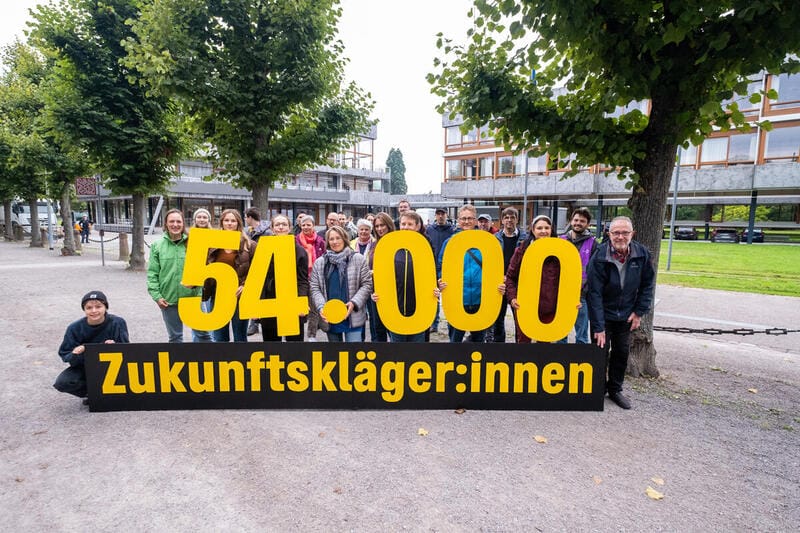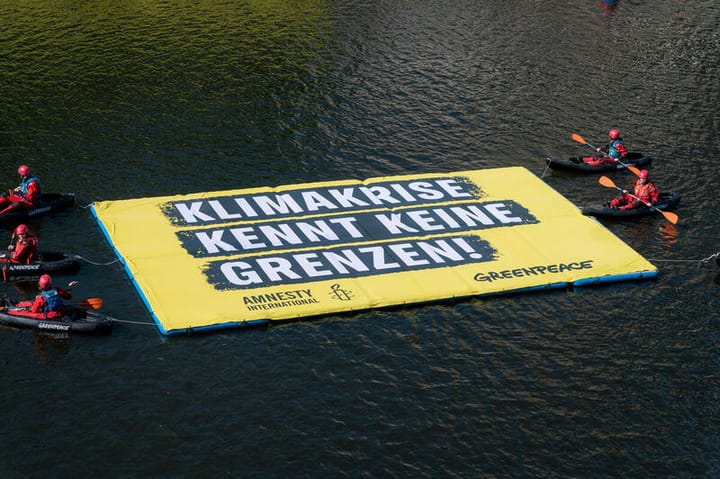'A very bureaucratic approach to the most existential threat of the century': Neubauer and the German climate case three years on

A spate of constitutional complaints against the German government’s handling of the climate crisis were launched following Urgenda’s success in the Netherlands. But as is often the case with strategic litigation, the landmark judgment delivered in 2021 has had a mixture of victories, failures and unintended consequences.
To tell the story of the first ruling, let’s go back to 2019 when a young Luisa Neubauer started organising protests as part of Fridays for Future, the youth climate movement sparked by Greta Thunberg.
This led to the biggest climate demonstration in German history in 2021. “It mattered to us that this wasn’t just children demanding a future,” said Neubauer, speaking in Egypt during COP27. “But it was us saying this is about the present. This is a society rising up to the moral question of the century, knowing that we are one of the countries most responsible in the world.”
That same day, the government came together under then German chancellor Angela Merkel to write a climate plan. According to Neubauer, one scientist reacted to this by saying: ‘I can’t eat as much as I want to throw up reading this.”
It was that moment that Neubauer, then aged 23, and a group of eight other young activists felt ready to go to court. The group included Lüke Recktenwald, whose future on the North Sea island of Langeoog is at threat, and Sophie Backsen, whose family has farmed on the North Sea island of Pellworm for generations.
Together with the help of German lawyer Roda Verheyen, who is also supporting Saúl Luciano Lliuya’s case against RWE in Germany, they sued the government “over the very climate bill that we pressured them to commit to in the first case”.
They weren’t the only ones eager to try the legal approach. Around the same time many other constitutional complaints were filed by individuals from within Germany, individuals outside Germany including Indigenous lawyer Yi Yi Prue and others from Bangladesh and Nepal, and organisations including Bund für Umwelt und Naturschutz Deutschland (BUND), Deutsche Umwelthilfe (DUH) and Germanwatch.
Neubauer said none of the young claimants entered the challenge light-heartedly. “We didn’t go to court because we thought it was the easiest thing to do, but because we severely felt that we had gone every other way.”
'It's about your freedom'
The legal teams had to find a way of showing how climate change would potentially affect privileged white people. “That was really tricky to find out,” said Neubauer. “Eventually we went to court with a group of siblings that live on a low-lying island that have a farm there that they should inherit at some point. We argued at the court that their farm would be useless to them because the soil would be too salty… It felt very German, looking back, finding out this very bureaucratic approach to the most existential threat of the century.
“But it was the court, eventually, that twisted that around. Because the court didn’t care about the salty soil. The court came out and said: ‘Look it’s about your freedom. It’s about your fundamental right to safety.’”
And they won, at least to a degree. The Constitutional Court decided jointly on the various complaints and in April 2021 ruled that the country's 2019 climate protection act was unconstitutional because it postponed serious emission cuts until after 2030 and did not explain in detail how they would be achieved after that date. Doing so, it said, violated the fundamental rights of people in the future who would have much bigger burdens imposed on them.
The court did acknowledge the standing of individuals from Bangladesh and Nepal to bring such a case, but denied their claims on the merits.
To address the problem, the government was told to put in place targets to cut national emissions after 2030.
Francesca Mascha Klein, legal officer for strategic litigation at Germanwatch, told The Wave that article 20a of the German constitution (or Basic Law) had always been understood to mean the state should aim for or environmental protection in the abstract sense. “For the first time, a court said: ‘No, there's actually a very concrete obligation here.”
Article 20a - Protection of the natural foundations of life and animals
Mindful also of its responsibility towards future generations, the state shall protect the natural foundations of life and animals by legislation and, in accordance with law and justice, by executive and judicial action, all within the framework of the constitutional order.
The case widely become known as ‘Neubauer’, because she was the highest profile claimant. But in Germany it is simply called Klimabeschluss. The plaintiffs and climate campaigners across Germany celebrated the judgment.
WIR HABEN GEWONNEN!!! Unserer #Klimaklage vor dem #BVerfG wurde zugestimmt. Es ist riesig. Klimaschutz ist nicht nice-to-have, Klimaschutz ist unser Grundrecht. Jetzt kämpfen wir weiter, für eine 1,5 Grad Politik, die unsere zukünftigen Freiheiten schützt, statt sie zu gefährden.
— Luisa Neubauer (@Luisamneubauer) April 29, 2021
German politicians were quick to jump in. Peter Altmaier, then minister for economic affairs and energy, described the ruling as both "major and significant”. And Olaf Scholz, then Germany’s finance minister and now chancellor, promised to urgently prepare a draft bill to advise the federal government.
“When we won two strange things happened,” Neubauer told listeners at COP27. “One is that our own government that we just defeated in the highest court in the country would come to us and applaud, which was a big mistake to make.
“And the other thing they did was call it a victory for the climate movement. And whereas it is indeed a big case… for me it was a sad day. I don’t think any young person in any democracy around the world should have to sue their own government over their climate inaction. And I don’t think that anyone should win over their government that was once known internationally at conferences like these to be a climate leader.”
In response, outgoing chancellor Merkel pushed through a new version of the national climate law, bringing forward the target date for net zero by five years to 2045. Goals to cut emissions were also set for after 2030.
Klein, who at the time was working at ClientEarth on a German fossil fuel phase-out, notes that some of these changes had been already been planned to bring Germany into line with EU law. The response was also caught up in national elections, with Merkel wanting to position herself as a climate leader, so it is difficult to untangle the effects of politics and litigation.
The court’s framing of the problem itself was problematic too. “There's a very strong narrative [that] what's really violating our fundamental rights are climate protection measures and not the climate change itself,” says Klein.
And ultimately, many argued that the ruling did not lead to a climate law in line with the Paris Agreement. Less than a year after the ruling, DUH and its individual claimants went back to the constitutional court claiming that the updated climate law did not mean Germany was making a fair contribution to its international obligations.
The court missed other opportunities too, says Klein, such as strengthening requirements on public authorities to act in compliance with targets rather than just have regard to them. “So you're constantly seeing political decisions being made that are actually not in line with the climate protection act - for example, passing an LNG acceleration act.”
Neubauer herself has remained very cautious - perhaps even a little cynical - about the whole affair.
Speaking in November 2022, she was still concerned that the case would not have the impact it needed. “We have not yet found out how to use what we won in court in a way that even those governments who have such an addiction to fossil fuels will…actually deliver.”
Christoph Störmer, policy advisor on climate litigation for DUH, says there is a perception that the decision was celebrated “more than the actual outcome”. But for him, what is important is the arguments that the constitutional court made in its judgment, which have been used extensively in subsequent lawsuits.
Many of these cases failed; legal claims against the LNG law, carmakers and an oil and gas firm were dismissed, as were attempts to force individual German states to pass their own climate laws. The 2022 follow-up constitutional claim was also thrown out of court.
But in November 2023, a court sided with DUH and BUND who argued that the federal government had failed to achieve climate goals in the transportation and building sectors.
And in May 2024, the government was ordered to improve its climate protection programme by the Higher Administrative Court of Berlin-Brandenburg. The judge upheld a pair of lawsuits brought by DUH based on Germany's 2030 emissions targets: one on cutting emissions from transport, building and other sectors, and the other on land use and forestry.
The government has appealed the November 2023 ruling and the first May decision. But it has not done so for the second, so should at the very least be making substantial changes to its land use programme. “This is quite a big victory,” says Störmer.
There have been some unintended political consequences of this litigation glut in the intervening months.
One is pushback on the idea that environmental organisations should have power to bring these kinds of claims.
The other is that Germany watered down its country’s climate law by removing emission goals for individual sectors.
Störmer says the government realised it was not going to meet climate targets for particular sectors so it simply removed that legal requirement. Dr Felix Ekhardt, director of the Research Unit Sustainability and Climate Policy in Leipzig, describes this as a “trick” to avoid accountability.
Climate campaigners were incensed, and once the new law was formally signed on 16 July lawyers went back to their much-used books of constitutional law.

The first case to be filed was by DUH alongside 12 teenagers and young adults.
In September this was followed by BUND and Solarenergie-Förderverein Deutschland, alongside four individual plaintiffs: Kerstin Lopau, Karola Knuth, André Wendel and Dr Mareike Bernhard.
Greenpeace and Germanwatch, with more than 54,000 individual plaintiffs including Neubauer, Recktenwald and Backsen from the previous case, also filed in September.
These claims each have their own nuances. But they all rely heavily on the 2021 ruling, which found that responsibility cannot simply be dumped onto future generations, to contest the latest legislative change. “We are quite certain that the current law doesn't meet the required constitutional standards that were established in 2021,” says Störmer.
The cases also expect to leverage the European Court of Human Rights’ landmark climate ruling earlier this year, which accepted the arguments of an association of older Swiss women that their human rights were being breached. They will argue that Germany’s carbon budgets are not in line with a 1.5°C warming threshold. And they will add organisational plaintiffs to test the German rule that constitutional complaints can only be made by individuals.
Klein says public authorities and many political figures have been slow to understand the importance of the 2021 judgment. But litigators have not; a similar line of argument was used recently in a landmark constitutional climate judgment in South Korea.
"There is a mismatch between the hopes that were linked to the climate judgment in the short term, and the reality”
“I think there is a mismatch between the hopes that were linked to the climate judgment in the short term, and the reality,” says Klein. “But that’s strategic litigation. You never have this one case that solves it all. You always have these little building blocks, I guess, and they pave the way.”
Should all these organisations be concentrating their time and resources on a single complaint? Experts admit there is repetition in legal arguments, but say climate lawyers in different organisations do cooperate well and presenting a variety of arguments to a court can be an advantage. “Every complaint can have a slightly different perspective on the matter, and that allows the constitutional court to kind of cherrypick the argumentation,” says Störmer.
For her part, Neubauer said the 2021 judgment "made it clear that we have a right to climate action”. But she remains committed to more direct activism too, leading a large Fridays for Future protest in Berlin in September.
Today in Berlin! This is big. It’s not easy being a climate activist these days yet hope is all around. #climatestrike #nowforfuture pic.twitter.com/A9jze0yts7
— Luisa Neubauer (@Luisamneubauer) September 20, 2024
Störmer sees litigation as a strong weapon in Germany, but also a very slow way of making progress. “In my personal opinion, those court rulings don't replace or substitute political pressure or political movement on the street. In the end, in every ruling there's room for interpretation for the government how to implement it. It is always our goal that the government pursues climate protection without us having to sue them.”


